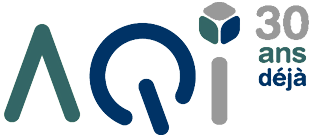It should be emphasised that these duties and obligations complement the AQIII code, to which all members of the executive belong. This tool promotes transparency in situations likely to generate conflicts of interest.
The Board of Directors is responsible for dealing with any breach of the Code, and reserves the right to decide on the action to be taken, including the dismissal of a member if necessary.
The Association québécoise des informaticiennes et informaticiens indépendants (AQIII) was created in November 1993 as a non-profit association.
It provides a sharing community for independent IT consultants so that they can benefit from the strengths and tools of a professional network to promote their success and preserve their freedom of action as micro-entrepreneurs.
The association promotes IT mandates, networking, information sharing between IT specialists and economies of scale with targeted suppliers.
AQIII recognizes that networking and mutual assistance on common needs are important values for the association and its members.
General
1. All references to the masculine gender apply equally to men and women.
2. An information technology (IT) department covers the planning, design, coordination, management, implementation, deployment, maintenance and evaluation of a technology-based business solution.
3. A customer is someone who makes the decision to purchase an IT service.
-
- It may be an end customer purchasing this IT service for its own needs;
- It may be an intermediary customer when it purchases this IT service for the needs of its own customers.
4. A supplier is a service provider who assists the self-employed worker in carrying out his assignments.
5. This code of ethics is not a substitute for the law and takes precedence where its rules are more precise or more stringent.
A commitment to our customers
6. Self-employed workers ensure that their contractual relationship with their customers is clear and communicated, and that it remains so.
7. Self-employed workers carry out their mandates with a high level of moral responsibility, integrity and respect.
-
- He does not harm his customers or allow them to be harmed;
- He ensures that he understands the consequences of his professional actions and keeps them within legal limits and generally accepted technical and professional standards in the IT industry;
- He treats his customers’ success on the same level as his own.
8. Self-employed workers provide services that are adapted to their knowledge and skills.
-
- If they are unable to meet their commitments, they inform their customers and help them to find a solution that will enable them to meet their commitments.
9. Self-employed workers respect their obligations to their customers.
-
- He completes these tasks with diligence, impartiality and honesty;
- It maintains its objectivity and declares all relevant information to its clients;
- It avoids situations of conflict of interest and informs its clients of any apparent or proven potential conflict of interest;
- It does not permit the dissemination of false, inaccurate or incomplete information, or the performance of activities that run counter to its obligations to its customers;
- It ensures that its suppliers do the same, where appropriate.
10. Self-employed workers respect the confidentiality and ownership of information, as well as the protection of and respect for their clients’ hardware and software.
A commitment to our suppliers
11. Self-employed workers ensure that their contractual situation with suppliers is clear and communicated, and that it remains so.
12. Self-employed workers treat their suppliers with a high degree of moral responsibility, integrity and respect.
-
- It avoids damaging its suppliers and allowing them to be damaged;
- They ensure that they understand the consequences of their professional actions and keep them within legal limits and generally accepted technical and professional standards in the IT industry;
- It treats the success of its suppliers at the same level as its own;
- It recognises the work of its suppliers;
- It declares all relevant information to its suppliers.
13. Self-employed workers ensure that their suppliers have the knowledge and skills to carry out their tasks.
-
- If suppliers are unable to meet their commitments, the self-employed worker undertakes to find solutions with his customers to meet his obligations.
14. Self-employed workers respect the confidentiality and ownership of information as well as the protection of and respect for their suppliers’ hardware and software.
To become a member
As a member, you benefit from a range of services to support your growth in the IT industry.

